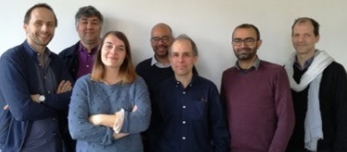Environmental group
 Environment and psychiatric pathologies program
Environment and psychiatric pathologies program
The objective of this program is to identify the impact of environmental factors on psychiatric pathologies (increased risk, modification of the course of the disease, comorbidities) and to understand their mechanisms of action.
The study of the influence of environmental risk factors in mental disorders is a major public health issue because of the high frequency of exposure of the population to some of these factors (air pollution, cannabis, etc.) and the possibility of implementing preventive measures.
Within this framework we have:
– contributed to the identification of environmental risk and modifying factors: advanced paternal age (1), childhood trauma (2), urbanicity (3), belonging to an ethnic minority (4), cannabis (5)
– clarified the frequency of the main physical comorbidities and analyzed their determinants
– contributed to current theoretical debates on the etiology of complex psychiatric disorders by introducing the notion of variability factors (6) and questioning prevention strategies (7).
Translated with www.DeepL.com/Translator (free version).
Following on from these contributions, our research is currently focused on:
– exploring the mechanisms by which identified factors increase the risk of psychiatric illnesses (e.g. air pollution and the roles of psycho-social stressors for urbanicity; social defeat, discrimination for belonging to an ethnic minority, etc.)
– identification of biological markers associated with some of these factors and mechanisms (e.g. telomere length (8)
– exploration of gene x environment interactions in collaboration with other programs (notably immuno-psychiatry and genetics).
Selected publications
Schürhoff F, Pignon B, Lajnef M, Denis R, Rutten B, Morgan C, Murray RM, Leboyer M, van Os J, Szöke A; EU-GEI WP2 Group Author. Psychotic Experiences Are Associated With Paternal Age But Not With Delayed Fatherhood in a Large, Multinational, Community Sample.
Schizophr Bull. 2020 Feb 12;46(5):1327-34.Baudin G, Szoke A, Richard JR, Pelissolo A, Leboyer M, Schürhoff F. Childhood trauma and psychosis: Beyond the association.
Child Abuse Negl. 2017 Oct;72:227-235.Szöke A, Charpeaud T, Galliot AM, Vilain J, Richard JR, Leboyer M, Llorca PM, Schürhoff F. Rural-urban variation in incidence of psychosis in France: a prospective epidemiologic study in two contrasted catchment areas.
BMC Psychiatry. 2014 Mar 17;14:78.Tortelli A, Simon P, Lehouelleur S, Skurnik N, Richard JR, Baudin G, Ferchiou A, Leboyer M, Schürhoff F, Szöke A. Characteristics associated with the risk of psychosis among immigrants and their descendants in France.
Brain Behav. 2021 May;11(5)Baudin G, Godin O, Lajnef M, Aouizerate B, Berna F, Brunel L, Capdevielle D, Chereau I, Dorey JM, Dubertret C, Dubreucq J, Faget C, Fond G, Gabayet F, Laouamri H, Lancon C, Le Strat Y, Tronche AM, Misdrahi D, Rey R, Passerieux C, Schandrin A, Urbach M, Vidalhet P, Llorca PM, Schürhoff F; FondaMental Academic Centers of Expertise for Schizophrenia (FACE-SZ) Collaborators. Differential effects of childhood trauma and cannabis use disorders in patients suffering from schizophrenia.
. Schizophr Res. 2016 Aug;175(1-3):161-167.Szoke A, Pignon B, Boster S, Jamain S, Schürhoff F. Schizophrenia: Developmental Variability Interacts with Risk Factors to Cause the Disorder: Nonspecific Variability-Enhancing Factors Combine with Specific Risk Factors to Cause Schizophrenia.
Bioessays. 2020 Nov;42(11):e2000038.Szöke A, Kirkbride JB, Schürhoff F. Universal prevention of schizophrenia and surrogate endpoints at population level.
Soc Psychiatry Psychiatr Epidemiol. 2014 Sep;49(9):1347-51.Schürhoff F, Corfdir C, Pignon B, Lajnef M, Richard JR, Marcos E, Pelissolo A, Leboyer M, Adnot S, Jamain S, Szöke A. No alteration of leukocyte telomere length in first episode psychosis.
. Psychiatry Res. 2021 Jul;301:113941.